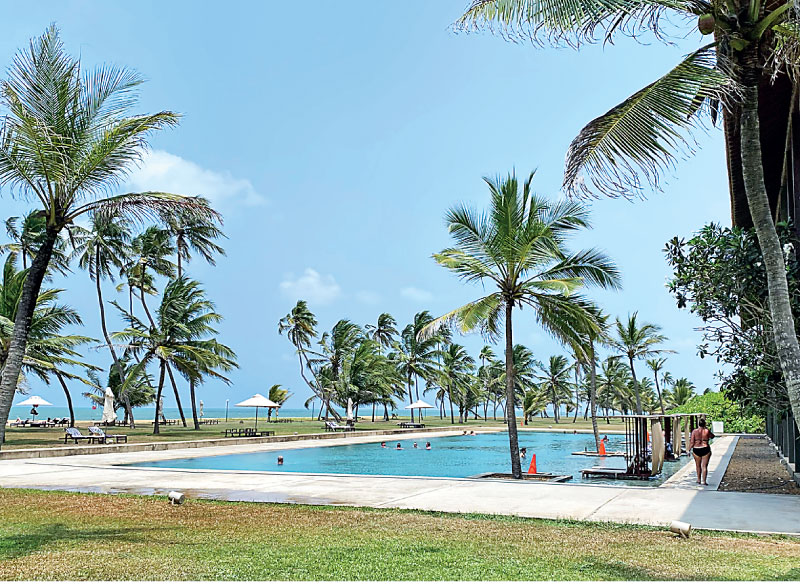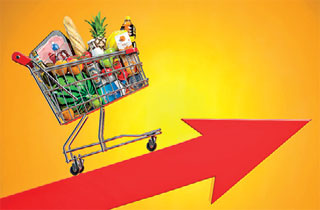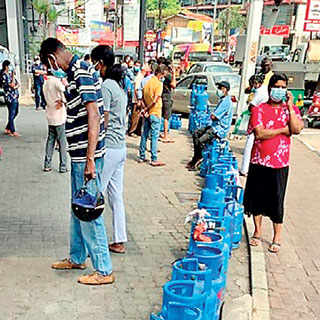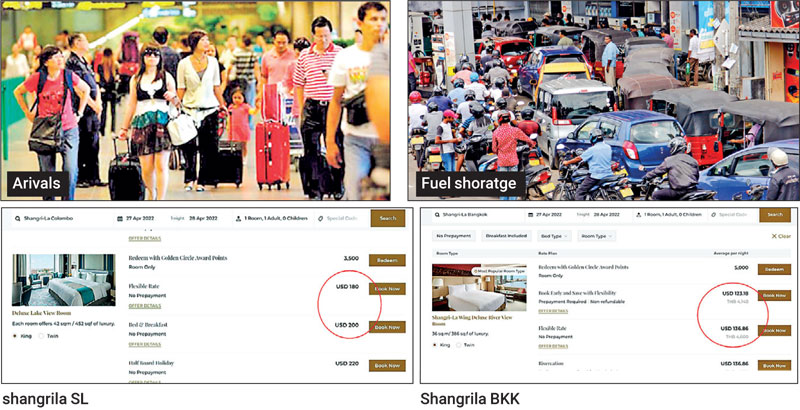Tuesday Feb 17, 2026
Tuesday Feb 17, 2026
Saturday, 2 April 2022 00:00 - - {{hitsCtrl.values.hits}}

Hotel
 We in the tourism industry are no strangers to falling on our knees. We are quite used to it. SARS, Bird Flu, airport bombings, a 25-year internal terrorist war, JVP uprising, COVID… we have seen it all. We are quite used to gingerly dusting our knees and slowly rising up, only to be dealt a fresh blow to bring us back to our knees.
We in the tourism industry are no strangers to falling on our knees. We are quite used to it. SARS, Bird Flu, airport bombings, a 25-year internal terrorist war, JVP uprising, COVID… we have seen it all. We are quite used to gingerly dusting our knees and slowly rising up, only to be dealt a fresh blow to bring us back to our knees.
And when the recent COVID pandemic hit us, we thought it was the ‘mother of all crises’ and just as we are raising our head once again, the massive and unprecedented Sri Lankan economic crisis hits us. Maybe this time it’s the ‘mother of the mother of all crises!’ So once again here we are getting ready to go down on our knees again.
But this time it’s hitting us from all fronts like never before.
Arrivals and revenue
The very bad publicity in the international media about the acute shortage of food, fuel, gas and other essential items, augmented by viral negative social media first hand posts by some tourists, and serous travel advisories by UK, USA and Canada are causing serious doubts in potential travellers’ minds about holidaying in Sri Lanka. Although arrivals are still holding up, we are seeing a gradual slowing down of forward bookings and a few cancellations also. Two of Sri Lanka’s leading economists state that ‘things are going to get much worse before getting better’.
Additionally for our bad luck, the war in Ukraine has severely reduced two of our major source markets. Ukrainian tourist arrivals have completely stopped, but Russian arrivals are still coming in but for how long it is unclear due to possible impending flight restrictions.
So, the industry’s ability to woo tourists to come to Sri Lanka, and consequently increase much-needed foreign exchange revenue, will be severely compromised in the medium-term future.
 |
| Food price |
 |
| Serve
|
Operations and cost
Food cost
Sri Lanka’s food inflation is said to be around 25% and there is an embargo of a wide range of imported food items which are used in hotels (specially city hotels).
In hotel operations, food cost (normally measured as a percentage of food cost to food revenue) is one of the most important indices that is tracked on a daily basis in operations. The international industry norm is about 35% on food and 25% on beverage sales. With a 70/30 mix on sales, this will give an overall cost percentage of around 32%.
Discussions with a few leading chefs in hotels and operations managers indicate that food cost of Sri Lankan hotels, currently around 35%, may rise to around 45% or more at current rates. (Most resort hotels quote rates as a composite package of food and room. Certainly, this composite dollar rate will yield more with the current devaluation of the dollar, but food and beverage price increases would outweigh this, resulting in a net increase in food cost percentage). However most certainly the rates for ala’ carte food will need to go up substantially to cover the increased cost.
Already Sri Lankan rates are not competitive in the region and increases may reduce our value proposition.
Fuel
With power cuts now a way of life, most larger hotels are compelled to operate their generators for extended periods of time on a daily basis (as of writing there is an announcement of possible 10-hour power interruptions).
Firstly, just procuring the required diesel for the generators is full of challenges. Despite repeated appeals to the Government to provide a proper system for distribution of diesel to hotels, nothing has been forthcoming. As a result, every day, hotel staff have to stay in long queues to get diesel pumped into barrels. Often, they are refused, and sent from pillar to post to get authorisation letters from various Government officials. So, every day there is more than three-quarters of a day lost in a totally frustrating and unproductive activity.
Some smaller hotels who do not have the luxury of having their own generators, have no option but to be without power and light candles and lamps at night.
Generators
Those hotels lucky enough to have generator sets are now called upon to operate them for long periods on a daily basis. These generators are rated for standby operations and not for prolonged use. So eventually the wear and tear will catch up and there will be breakdowns, with maintenance and repair costs also increasing dramatically.
Purchases
Most hotels contract with specific suppliers for supply of food and other items required for operations. However, because of the volatility of the economic situation of the country, suppliers are now refusing to forward contract and are willing to supply on a daily spot market price only. This causes great difficulty in forward planning of hotel operations, menu planning and cost management. Eventually there will be shortcomings in the product quality to the guests.
Hygiene
The start-stop cycles of power supply and generators will cause some downtime in operation of freezers and cold rooms in hotels. In times like this, hotels would have to stock up meats and other food items on availability in their freezers. However careful one may be, there could be danger of frozen items thawing out intermittently, causing dangerous bacteria to grow. Freezing does not kill germs and bacteria. Instead, it essentially puts them into hibernation. They are inactive while the food is frozen and will “wake up” as soon as the food thaws. When the temperature rises the bacteria returns with a vengeance.
So, there is the real danger of food poisoning to take place in a hotel under the current conditions.
 |
| Freezer |
 |
| Gas shortage |
 |
| power cuts
|
Other operational expenditure
As evidenced in our daily life now, the price of every single good has gone up. Although many items are not directly affected by the devaluation, prices have increased due to peripheral and indirect costs (such as transport and distribution costs) going up.
Hotel operational costs consist of a myriad of items ranging from cleaning materials and chemicals, disposable napkins, toiletries, disposable utensils, etc. Hence it is expected that overall operations cost would increase by about 50% from last year.
This will shrink the already thin operating margins of hotels, and in many cases may even go negative.
Staff
Hotels are seeing a dramatic shift in the sentiments of young prospective employable people for the industry. Many of these youngsters have no interest or passion to start a career, and are not prepared to work long hours, patiently learn a skill, which are all prerequisites of working in the tourism industry. They are only seeking a ‘quick fix’, and are more interested in pursuing a job as an Uber or Tuk Tuk driver, on the misguided notion of ‘big money’ while being self-employed.
Hence it is to be expected that there will acute shortage of frontline staff, and also calls for increase of salary levels for all staff, further adding to cost burden on hotels.
All the above issues will only erode the product and service offering of Sri Lankan hotels.
Marketing and promotions
Foreign sales and marketing
Most hotels now have good social media and other digital internet-based marketing initiatives. However, tourism is a people’s business and face-to-face B2B is vital at least in a limited fashion. With airfares skyrocketing, and the weakening dollar, foreign sales and marketing calls will be a thing of the past, to many hotel marketers due to the exorbitant costs involved.
Competitiveness
The common call would be to raise room rates. It is a known fact that Sri Lanka hotels are not competitive in the world market especially vis-a-vie its Asian competitors.
Our current value proposition is poor, and any further increase in room rates may cause us to lose whatever market share we are currently enjoying internationally from our source markets.
With the aforementioned staff problems Sri Lanka’s legendary ‘warm customer service’ is also fast receding. And the already poor productivity levels will sink even further.
So, while certainly rate increases may be warranted, Sri Lanka is not in a favourable position to pursue this strategy unless the brand equity and value proposition can justify and sustain such an increase.
Conclusion
Hotel operations are complex. Period. We are in the business of ‘making dreams come true’. We operate 24 x 365. We never close. We do not have the luxury of operating like a shop. Open to customers from 9 a.m. to 6 p.m. And having all the time in the world to review the day’s operations and customer feedback, and make course corrections to rectify shortcomings the next day. There are no down times. No ‘off days or weekends’ to recuperate. We in hotels have to do all these things (and more) all ‘on the run’.
Therefore, efficient hotel operations have to be well-planned, and should work like a well-oiled machine.
In the current context, when day-to-day operations have to be planned out virtually on an hour-by-hour basis, not knowing what fresh shortage or issues will crop up at the next moment, not knowing how to obtain essential ‘inputs’ for the process, it is no small wonder that we are once again ‘on our knees’.
It is not rocket science to understand that tourism is the one industry that can help mitigate the current economic crisis on the fast track. We were the third largest foreign exchange earner for the country, bringing in some $ 4 billion+ just a few years ago before the pandemic. On a real value-added basis tourism was No. 2. It is in reality a large export industry, earning valuable foreign exchange to the country, without the extras of export logistics, with consumption taking place at the source of production itself.
With no light at the end of the tunnel as to how we are going to overcome this crisis, this time it appears this ‘mother of the mother of all crises’ will result in a ‘long wait on our knees’ with many casualties on the way, unfortunately.
Any sane thinking government should therefore set up a high-level emergency taskforce with executive powers, under the direction of the President himself, to streamline and help the industry needs, meeting even on a daily basis.
All the industry needs, is help to keep its head above the water now. This private sector-led industry has proved time and again of how resilient we are, and given the necessary support, we will be able to not only weather the storm, but at the same time, help the country in some way out of this economic quagmire, by generating vital foreign exchange earnings.
